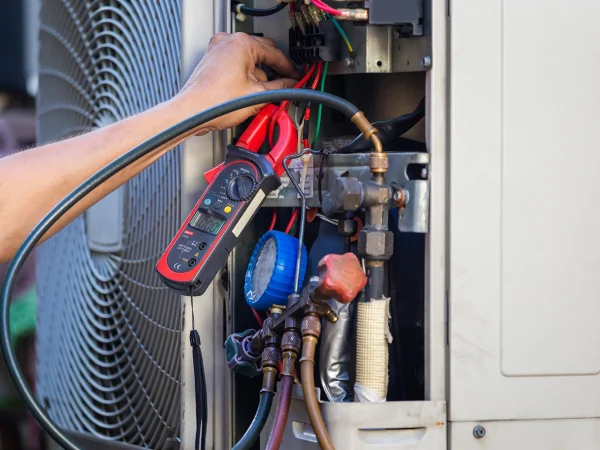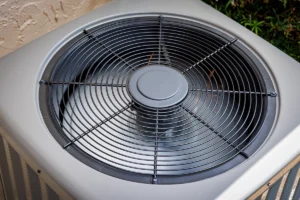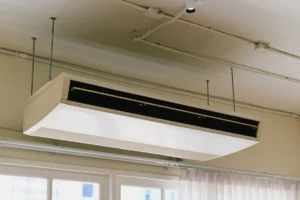Living in Vancouver, WA, where we experience everything from chilly Columbia River winds to scorching summer days, understanding what are CFMs in your heat pump system isn’t just technical jargon – it’s essential knowledge for maintaining a comfortable home. As your local heat pump experts at Professor Heat Pump, we’re here to break down this crucial aspect of HVAC systems in terms that every Pacific Northwest homeowner can understand. Additionally, proper airflow management becomes increasingly important as our region experiences more extreme weather patterns.
What Does CFM Mean?
First things first, let’s demystify CFM. Cubic Feet per Minute (CFM) measures how much air moves through your HVAC system. Think of it like our beloved Columbia River’s flow rate, but instead of water, we’re measuring air. When our customers ask, “What are CFMs?” we explain that it’s similar to measuring how many basketballs could pass through a doorway each minute – except we’re dealing with air you can’t see. Moreover, understanding CFMs helps you make informed decisions about your home’s comfort system.
The science behind CFMs is fascinating, especially when you consider how it affects our daily comfort. Furthermore, just as the river’s flow changes with the seasons, your HVAC system’s CFM requirements vary throughout the year. Subsequently, this understanding becomes crucial for maintaining optimal indoor comfort during our diverse Vancouver weather conditions.
Why CFMs Matter in Your Vancouver Home
Here in Clark County, where we deal with both humidity from the river and dry summer heat, proper airflow is crucial. Furthermore, your heat pump’s efficiency depends heavily on maintaining the right CFM levels. Just as our local wind patterns affect how we dress for the day, CFMs affect how effectively your system heats and cools your home.
Moreover, correct CFM levels ensure:
- Even temperature distribution throughout your home, particularly important during our temperature swings
- Proper humidity control during our wet winters and increasingly dry summers
- Reduced energy consumption, which is especially important given our regional energy costs
- Better indoor air quality, particularly during wildfire season and spring allergies
- Consistent comfort in every room, regardless of your home’s layout or size
- Extended system lifespan through optimal operation
Ideal CFM Ratings for Pacific Northwest Homes
Subsequently, determining the right CFM rating for your space isn’t one-size-fits-all. In addition to room size, we consider factors unique to our area, such as:
- Our moderate but variable climate
- Your home’s exposure to river winds
- Local building codes and standards
- Your home’s insulation level
- The number of windows and their orientation
- Your family’s specific comfort preferences
- Local seasonal changes and their impact
What Are CFMs That Work Best for Different Rooms?
Generally speaking, you’ll want different CFM levels for different spaces. For instance, a typical bedroom needs different airflow than your open-concept living room. Meanwhile, spaces like basements, which are common in Vancouver homes, require special consideration due to our regional moisture levels. Consequently, proper CFM allocation ensures every room maintains its ideal comfort level.
Factors Affecting Your System’s CFM
Additionally, several factors can impact your system’s CFM performance:
- Ductwork Configuration – In older Vancouver homes, especially those built before the heat pump boom, ductwork might not be optimized for current HVAC systems. Therefore, we often recommend ductwork evaluations as part of our service. Furthermore, properly sized and sealed ducts can significantly improve your system’s efficiency.
- Filter Management – Given our region’s allergens, particularly during spring when the cottonwoods bloom, filter maintenance is crucial. As a result, we recommend regular filter checks to maintain proper CFM levels. Subsequently, clean filters ensure optimal airflow while protecting your indoor air quality.
- Local Environmental Factors – Furthermore, our unique Pacific Northwest environment plays a role. For example, homes near Frenchman’s Bar Park might deal with more dust, while those closer to downtown Vancouver face different air quality challenges. Additionally, proximity to construction areas or high-traffic zones can affect your system’s filtration needs.
- Seasonal Considerations – In particular, our changing seasons demand different approaches to airflow management. Therefore, regular system adjustments help maintain optimal performance year-round. Moreover, preparing your system for seasonal changes can prevent comfort issues before they arise.
How to Check Your System’s CFM
While professional testing provides the most accurate readings, there are ways to spot potential CFM issues:
- Uneven Heating or Cooling – If some rooms feel like the Columbia Gorge while others feel like Downtown Portland in August, you might have CFM problems. Nevertheless, these issues can often be resolved with professional adjustment.
- Excessive Dust – In particular, if you’re dusting more often than your friends in Battle Ground or Camas, your CFM levels might need checking. Consequently, this could indicate air distribution problems within your system.
- High Energy Bills – Poor CFM levels can lead to your heat pump working harder than necessary. Meanwhile, optimized airflow helps maintain system efficiency and reduce operating costs.
Improving Your System’s Airflow
Therefore, to maintain optimal CFM levels, consider these tips:
- Regular Maintenance – Just as we prepare our homes for different seasons in the Pacific Northwest, your HVAC system needs regular attention. In fact, scheduling maintenance before extreme weather hits is ideal.
- Ductwork Care – Additionally, keeping your ductwork clean and well-sealed is crucial. Hence, we recommend professional inspections, especially in older Vancouver homes.
- Filter Discipline – Above all, maintain a regular filter replacement schedule. Meanwhile, consider using high-quality filters appropriate for our local air quality needs.
- Professional Solutions – Nevertheless, some CFM issues require professional intervention. Fortunately, our team understands the unique challenges of Vancouver’s climate and housing styles.
Conclusion
Understanding what are CFMs and their impact on your home comfort is essential for every Vancouver homeowner. In conclusion, whether you’re in Salmon Creek, Hazel Dell, or anywhere in Clark County, proper CFM levels can make the difference between a comfortable home and an inefficient system.
Would you like to learn more about how CFMs affect your heat pump’s performance? Or perhaps you’re wondering if your system’s airflow is optimized for our Pacific Northwest climate? Contact Professor Heat Pump today at (564) 888-5527 – we’re your neighbors here in Vancouver, and we understand the unique HVAC needs of our community.









